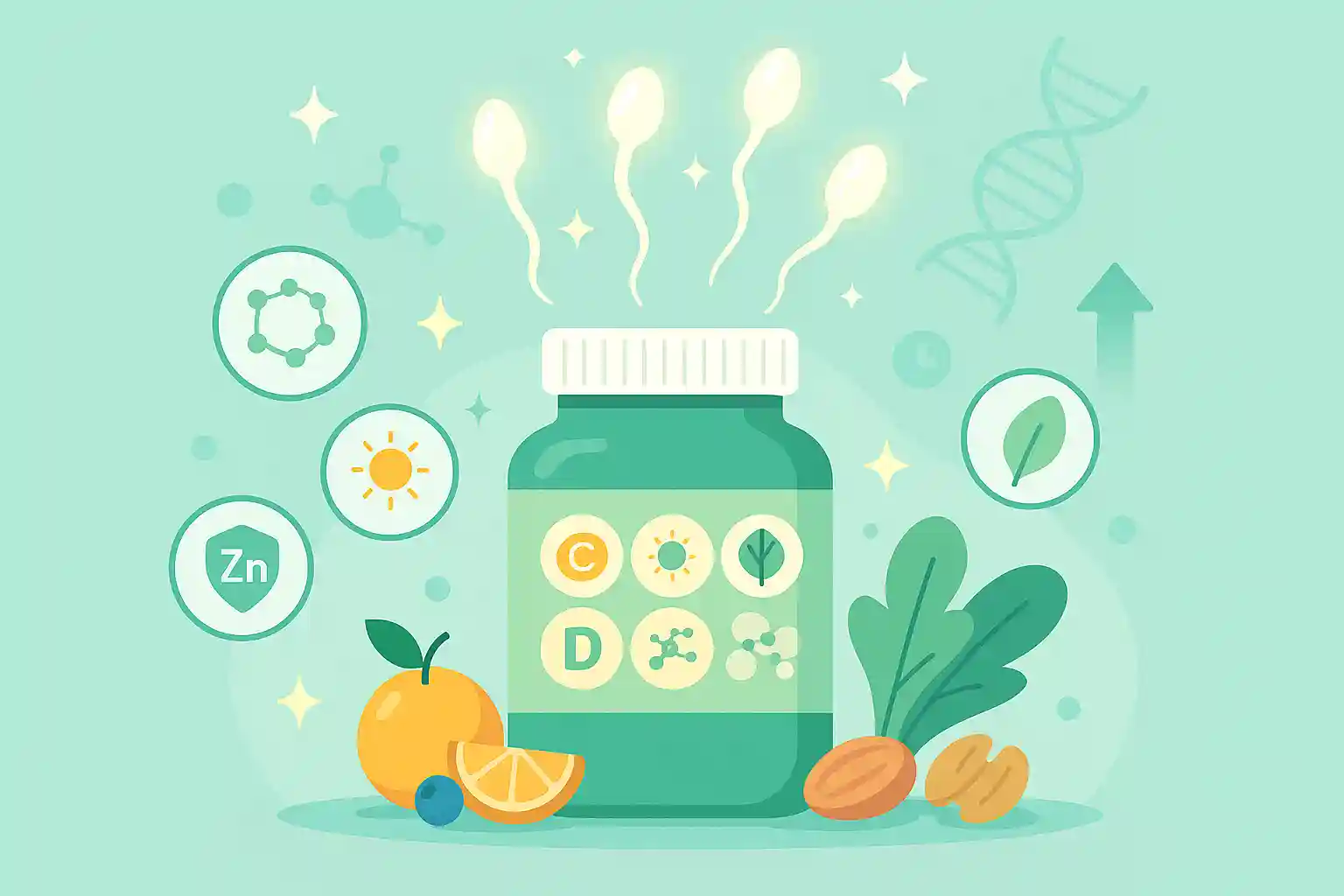While a healthy lifestyle forms the foundation of optimal sperm health, targeted supplementation can provide additional support for sperm quality, count, and motility. Research has identified several key vitamins and supplements that play crucial roles in sperm production and protection. Understanding which nutrients are most beneficial—and how to use them safely—can be a valuable addition to your fertility optimization strategy.
Essential Vitamins for Sperm Health
Certain vitamins are particularly important for optimal sperm production and function:
Vitamin C:
- Powerful antioxidant that protects sperm from oxidative stress
- Improves sperm count and motility
- Recommended dosage: 200-1000mg daily
- Natural sources: citrus fruits, berries, bell peppers, broccoli
Vitamin E:
- Works synergistically with vitamin C to protect sperm membranes
- Reduces DNA fragmentation in sperm
- Recommended dosage: 400-800 IU daily
- Natural sources: nuts, seeds, vegetable oils, leafy greens
Vitamin D:
- Essential for testosterone production and sperm development
- Deficiency linked to poor sperm quality
- Recommended dosage: 1000-4000 IU daily (based on blood levels)
- Natural sources: sunlight exposure, fatty fish, fortified foods
Folate (Vitamin B9):
- Critical for DNA synthesis and repair in sperm
- Low levels associated with increased DNA damage
- Recommended dosage: 400-800mcg daily
- Natural sources: leafy greens, legumes, fortified grains
Key Minerals for Sperm Production
Several minerals play vital roles in sperm health and male fertility:
Zinc:
- Most important mineral for male fertility
- Essential for testosterone production and sperm formation
- Deficiency directly linked to low sperm count
- Recommended dosage: 15-30mg daily
- Natural sources: oysters, beef, pumpkin seeds, chickpeas
Selenium:
- Crucial component of sperm structure and motility
- Powerful antioxidant that protects sperm
- Recommended dosage: 50-200mcg daily
- Natural sources: Brazil nuts, seafood, eggs, garlic
Magnesium:
- Important for sperm motility and energy production
- Supports overall reproductive health
- Recommended dosage: 200-400mg daily
- Natural sources: dark chocolate, nuts, seeds, whole grains
Specialized Fertility Supplements
Beyond basic vitamins and minerals, several specialized supplements have shown promise for sperm health:
Coenzyme Q10 (CoQ10):
- Enhances sperm energy production and motility
- Improves antioxidant capacity
- Recommended dosage: 100-300mg daily
- Particularly beneficial for men over 35
L-Carnitine:
- Crucial for sperm energy metabolism
- Improves sperm concentration and motility
- Recommended dosage: 1000-3000mg daily
- Often combined with acetyl-L-carnitine for enhanced effects
D-Aspartic Acid:
- May boost testosterone levels naturally
- Supports sperm production
- Recommended dosage: 3000mg daily
- Take cyclically (12 days on, 18 days off)
Omega-3 Fatty Acids:
- Essential for sperm membrane health
- Improves sperm count and motility
- Recommended dosage: 1000-2000mg daily (EPA + DHA)
- Natural sources: fatty fish, walnuts, flaxseeds
Antioxidant Powerhouses
Oxidative stress is a major threat to sperm health. These antioxidants provide extra protection:
- Lycopene: Found in tomatoes, may improve sperm concentration
- Astaxanthin: Powerful carotenoid that enhances sperm motility
- N-Acetyl Cysteine (NAC): Supports glutathione production
- Alpha-lipoic acid: Regenerates other antioxidants
- Resveratrol: May improve sperm quality and count
Combination Supplements vs. Individual Nutrients
When considering supplementation, you have two main approaches:
Male Fertility Multivitamins:
- Convenient one-stop solution
- Formulated with synergistic nutrients
- Often more cost-effective
- May contain lower doses of individual nutrients
Individual Supplements:
- Allows for targeted, higher-dose therapy
- Can address specific deficiencies
- More flexibility in timing and combinations
- May be more expensive and complex to manage
Timing and Duration of Supplementation
Understanding the timeline of sperm development is crucial for supplement effectiveness:
- Sperm development takes approximately 74 days
- Start supplementation at least 3 months before trying to conceive
- Consistent daily intake is more important than timing with meals
- Some supplements (like fat-soluble vitamins) are better absorbed with food
- Continue supplementation throughout the conception period
Safety Considerations and Potential Interactions
While generally safe, supplements require careful consideration:
- Consult healthcare providers before starting any supplement regimen
- Be aware of potential drug interactions
- Avoid mega-doses, which can be counterproductive
- Choose high-quality, third-party tested products
- Monitor for side effects and adjust accordingly
- Some supplements may interfere with blood tests
When Supplements May Be Most Beneficial
Supplementation may be particularly helpful in these situations:
- Poor diet lacking in key nutrients
- High levels of oxidative stress (smoking, pollution exposure)
- Age-related fertility decline
- Previous semen analysis showing poor quality
- Specific nutrient deficiencies identified through testing
- High-stress lifestyle or demanding work environment
Food First Approach
While supplements can be beneficial, they should complement, not replace, a healthy diet. Focus on obtaining nutrients from whole foods whenever possible:
- Eat a varied diet rich in fruits and vegetables
- Include high-quality proteins and healthy fats
- Choose whole grains over processed alternatives
- Limit processed foods, excess sugar, and trans fats
- Stay adequately hydrated
- Consider organic options to reduce pesticide exposure
Setting Realistic Expectations
Supplements can be a valuable tool in optimizing sperm health, but they're not miracle cures. The most effective approach combines targeted supplementation with a healthy lifestyle, including proper diet, regular exercise, stress management, and avoiding harmful substances.
Remember that individual responses to supplements vary, and what works for one person may not work for another. Working with a healthcare provider or fertility specialist can help you develop a personalized supplementation strategy based on your specific needs, health status, and fertility goals.
The journey to optimal fertility is a marathon, not a sprint. Give supplements time to work, stay consistent with your regimen, and maintain realistic expectations while focusing on overall health and well-being.


